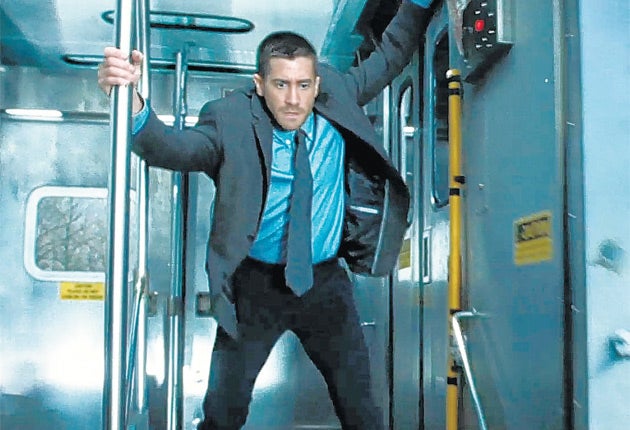Source Code (12A)
Starring: Jake Gyllenhaal, Michelle Monaghan, Vera Farmiga

In the life of a man, never/ The same time returns", said Thomas à Becket in Murder in the Cathedral. But Becket was about 700 years too early for the cinema, where a man may experience the same time returning over and over. You only have to think of Bill Murray in Groundhog Day rushing into a restaurant every night, just in time to smack the heaving back of a man who's started to choke on a bone. His life has been reduced to a sequence of immaculately timed tricks, like a magician's, or a god's.
But whereas Murray got an eternity to put the day right, Jake Gyllenhaal, in the sci-fi thriller Source Code, is granted a mere eight minutes. You could describe it as a matter of urgency. For the first few scenes you may be stuck to describe it at all.
Gyllenhaal plays a man who wakes up, with a start, on a commuter train heading for Chicago. Opposite him sits an attractive woman (Michelle Monaghan) who's mildly flirty and addresses him as Sean. Which would be great – except that his name isn't Sean, and he's never met the woman in his life before. And eight minutes later, just as it's getting interesting, the train blows up, killing everyone on board. Talk about a brief encounter...
But wait, things are about to get a whole lot weirder. Gyllenhaal wakes up again, this time in a cramped, dilapidated module where he's talking via video link to a controller (Vera Farmiga). Not unreasonably he asks her what the hell is going on. Is it a simulation test? All he can remember from his previous life is that he was Captain Colter Stevens, flying missions in Afghanistan. Well, that was true once, she says; now he's part of a "time reassignment" programme whereby his mind has been projected into the body of that commuter, a schoolteacher named Sean. It is his mission to uncover the identity of the train bomber and thus save many innocent lives. The catch is that he can be boomeranged through the space-time continuum repeatedly, landing up in the same compartment, sitting opposite the same woman, surrounded by the same suspects. Think of it as Repetitive Train Syndrome.
Source Code, written by Ben Ripley, is directed by Duncan Jones, who ran similar rings around consciousness in his acclaimed debut, Moon. The great gimmick of this new film is its license to thrill. This isn't just a race against the clock, it's one race after another, each played with small variations on the last, though all ending in that same gigantic explosion. Each time Gyllenhaal gets a little further inside the puzzle, buttonholing this or that passenger as suspicion dictates, and eventually locating the bomb itself, ticking away on an overhead panel in the gents' loo. I think it's at that point you start to wonder whether the past eight minutes are immutable – as universal law demands – or whether our hero's efforts may enable the train to dodge its fate. After all, what's the point in being a time-hopping Jason Bourne if you can't get one over the villain?
While the film entangles us in its fantastical perplexities, the real heart of it resides in the deepening bond between the stricken hero and his chance companion. Gyllenhaal and Michelle Monaghan start off so hopelessly out of sync with one another that any attraction looks doomed; they are talking at cross purposes, strangers on a train. Yet as each eight-minute scene unreels, we come to hope that, somehow, they will connect. For these two turn out to have chemistry, not to mention psychology, philosophy and double physics. Monaghan, with her pale skin and extraordinarily bright gaze, conveys a spiritedness at once sincere and playful, surpassing anything she has done before (Kiss Kiss Bang Bang, Gone Baby Gone). She wasn't to know that her encouraging line "Everything's going to be fine" would be the last thing either of them heard before the bomb went off the first time. He actually remembers the line in another eight-minute cycle, and asks her to say it, the sound of her voice being the one consolation to hold on to before imminent atomisation. Vera Farmiga (Up in the Air), awarded a less sexy, more functional role, also comes through strongly, her initial bureaucratic brusqueness softening into compassion for the distressed Gyllenhaal.
The sparky freshness and downbeat humanity of the women's performances carry the film over the line even when its final scenes wobble alarmingly. I'm not at all sure I followed the logic of its denouement, which is impossible to explain without giving away crucial parts of the plot. Suffice it to say that the American obsession with second chances is wantonly indulged, and death, after a few near things, shall have no more dominion. Perhaps we should take our hats off to Duncan Jones for managing to wrest any coherence from it at all. Think about it. A director puts a film together by doing several takes of a scene, each more or less identical. But what do you do when one scene is meant to be identical to another – when you repeat a scene that is itself already a repeat? Source Code won't stand up to scrutiny afterwards, but while it's thundering along you are absolutely committed to the ride; also confused and unsettled, but never for a minute bored.
Subscribe to Independent Premium to bookmark this article
Want to bookmark your favourite articles and stories to read or reference later? Start your Independent Premium subscription today.

Join our commenting forum
Join thought-provoking conversations, follow other Independent readers and see their replies